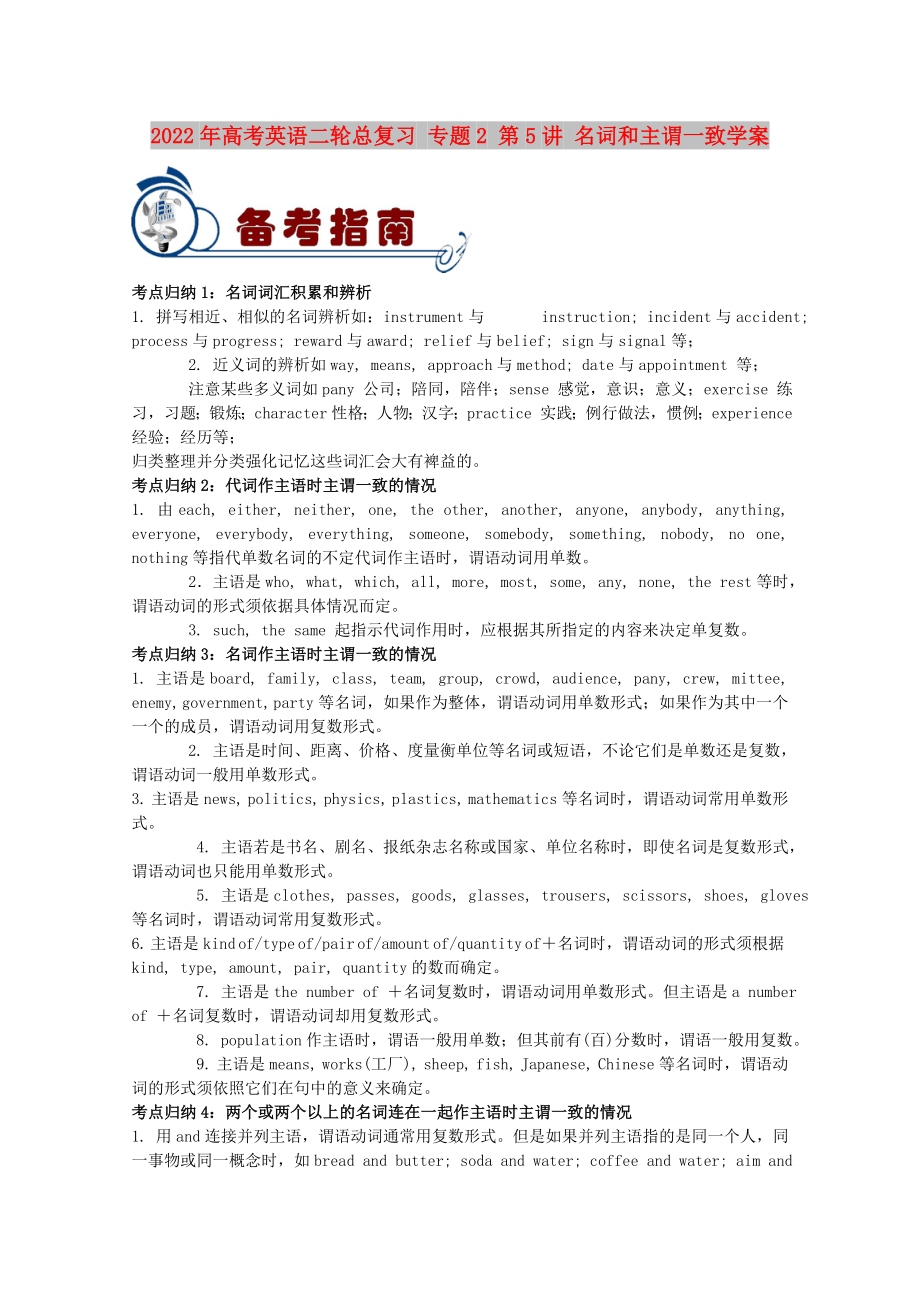《2022年高考英語二輪總復(fù)習(xí) 專題2 第5講 名詞和主謂一致學(xué)案》由會員分享���,可在線閱讀,更多相關(guān)《2022年高考英語二輪總復(fù)習(xí) 專題2 第5講 名詞和主謂一致學(xué)案(3頁珍藏版)》請在裝配圖網(wǎng)上搜索���。
1��、2022年高考英語二輪總復(fù)習(xí) 專題2 第5講 名詞和主謂一致學(xué)案
考點歸納1:名詞詞匯積累和辨析
1. 拼寫相近���、相似的名詞辨析如:instrument與 instruction; incident與accident; process與progress; reward與award; relief與belief; sign與signal等;
2. 近義詞的辨析如way, means, approach與method; date與appointment 等�;
注意某些多義詞如pany 公司;陪同�����,陪伴���;sense 感覺��,意識��;意義��;exerci
2����、se 練習(xí),習(xí)題���;鍛煉;character性格�;人物;漢字�;practice 實踐;例行做法��,慣例����;experience 經(jīng)驗;經(jīng)歷等���;
歸類整理并分類強化記憶這些詞匯會大有裨益的��。
考點歸納2:代詞作主語時主謂一致的情況
1. 由each, either, neither, one, the other, another, anyone, anybody, anything, everyone, everybody, everything, someone, somebody, something, nobody, no one, nothing等指代單數(shù)名詞的不定代詞作主語時�,謂語動
3、詞用單數(shù)�。
2.主語是who, what, which, all, more, most, some, any, none, the rest等時,謂語動詞的形式須依據(jù)具體情況而定�。
3. such, the same 起指示代詞作用時,應(yīng)根據(jù)其所指定的內(nèi)容來決定單復(fù)數(shù)�。
考點歸納3:名詞作主語時主謂一致的情況
1. 主語是board, family, class, team, group, crowd, audience, pany, crew, mittee, enemy, government, party等名詞,如果作為整體�����,謂語動詞用單數(shù)形式��;
4����、如果作為其中一個一個的成員,謂語動詞用復(fù)數(shù)形式��。
2. 主語是時間�����、距離、價格��、度量衡單位等名詞或短語���,不論它們是單數(shù)還是復(fù)數(shù)�,謂語動詞一般用單數(shù)形式�。
3. 主語是news, politics, physics, plastics, mathematics等名詞時,謂語動詞常用單數(shù)形式��?��! ?
4. 主語若是書名���、劇名�����、報紙雜志名稱或國家�����、單位名稱時�,即使名詞是復(fù)數(shù)形式,謂語動詞也只能用單數(shù)形式��。
5. 主語是clothes, passes, goods, glasses, trousers, scissors, shoes,
5�����、gloves等名詞時����,謂語動詞常用復(fù)數(shù)形式。
6. 主語是kind of/type of/pair of/amount of/quantity of+名詞時�����,謂語動詞的形式須根據(jù)kind, type, amount, pair, quantity的數(shù)而確定�����。
7. 主語是the number of +名詞復(fù)數(shù)時���,謂語動詞用單數(shù)形式��。但主語是a number of +名詞復(fù)數(shù)時���,謂語動詞卻用復(fù)數(shù)形式。
8. population作主語時,謂語一般用單數(shù)��;但其前有(百)分數(shù)時�����,謂語一般用復(fù)數(shù)��。
9. 主語是 means, works(工廠),
6���、 sheep, fish, Japanese, Chinese等名詞時��,謂語動詞的形式須依照它們在句中的意義來確定��。
考點歸納4:兩個或兩個以上的名詞連在一起作主語時主謂一致的情況
1. 用and連接并列主語��,謂語動詞通常用復(fù)數(shù)形式�����。但是如果并列主語指的是同一個人,同一事物或同一概念時����,如bread and butter; soda and water; coffee and water; aim and end; salt and water等,謂語動詞用單數(shù)形式。 如When and where to go for the on-salary holiday hasn't been
7���、 decided yet.
2. the+n1+and+n2指同一個人�,如the writer and painter, 謂語動詞用單數(shù)形式���。
3. and 所連接的兩個名詞前分別有every, each, no, many a 等修飾時�,謂語動詞用單數(shù)形式���。
4. 主語是連接詞or, either…or…����, neither…nor…�, whether…or…, not… but…��, not only…but also…等連接的名詞或代詞時��,謂語動詞的形式須與最接近的名詞或代詞保持一致�。
5. 主語是“A+ with / as well as / al
8、ong with / together with / like / rather than / except / but / including / plus / besides / in addition to+B”結(jié)構(gòu)時����,謂語須與A保持一致�。
6. more than one+名詞單數(shù)�;a+名詞單數(shù)+or two等作句子的主語時,謂語動詞用單數(shù)形式���。
考點歸納5:“the+形容詞或分詞”作主語時主謂一致的情況
1. “the + 形容詞/分詞”指人作主語時���,謂語動詞一般用復(fù)數(shù)形式?�! ?
2. “the+形容詞/分詞”指抽象概念作主語時�,謂語動詞一般用單數(shù)
9、形式�。
考點歸納6:句子、短語作主語時主謂一致的情況
1. 主語是不定式或動名詞時��,謂語動詞常用單數(shù)形式���。
2. 主語是從句時�����,謂語動詞一般用單數(shù)形式���,但在“主語+系動詞+表語”結(jié)構(gòu)中,如果是what從句作主語��,其謂語的單復(fù)數(shù)取決于后面的表語���。
3. 在強調(diào)句型“It +be +被強調(diào)部分+ that/who …”中����, be總是用單數(shù)形式�����;that/who 后的謂語動詞的形式必須跟被強調(diào)的主語保持一致���。
4. 定語從句中謂語動詞的形式必須跟先行詞保持一致��。
5. 當There/Here be后有幾個主語時�,be與鄰近的主語保持一致���。
10�、
例1:(xx·江西卷)What's the______����, in your opinion, of helping him if he doesn't make an effort to help himself?
A. sympathy B. theme
C. object D. point
【解析】D sympathy同情��;theme 主題����;object 物體�;point意義。句意為:你認為如果他沒有作出努力去幫助自己
11�����、而去幫助他的意義是什么��?What's the point of doing sth.? 意思為“做某事有什么意義����?”選D。
例2:(xx·江蘇卷)Teachers have to constantly update their knowledge in order to maintain their professional ______.
A. consequence B. independence
C. petence D. intelligence
【解析】 C 句意:教師需要持續(xù)
12�����、更新他們的知識�����,以便能夠保有他們的專業(yè)能力���。intelligence 智力�����,理解力��。petence 才指“能力”����。
例3:(xx·浙江卷)Anyway�����,I can't cheat him-it's against all my ______.
A. emotions B. principles
C. regulations D. opinions
【解析】B 考查名詞辨析�。emotion情感;principle原則�;regulation規(guī)定,制度�;opinion 看法,意
13��、見���。句意:不管怎樣我都不能欺騙他——這違反了我的原則��。
例4:(xx·全國卷Ⅱ)Barbara is easy to recognize as she's the only one of the women who______ evening dress.
A. wear B. wears
C. has worn D. have worn
【解析】B 考查主謂一致和時態(tài)���。首先the only one of…為先行詞時���,定語從句修飾的是one,即
14����、one是主語,而非后面的復(fù)數(shù)women���,根據(jù)主謂一致的原則����,謂語動詞應(yīng)該用單數(shù)�。當one前面沒有only修飾時,謂語動詞應(yīng)該用復(fù)數(shù)���。另外�����,從“is”可以看出句子是要表示一種習(xí)慣��,因此要用一般現(xiàn)在時����。
例5:(xx·湖北卷)Giving up my job to go back to full-time education was a big______, but now I know it was the best decision I ever made.
A. project B. mitment
C. petition D. ambition
【解析】B 考查名詞��。根據(jù)題意�����,放棄工作去接受教育是一個巨大的挑戰(zhàn)���。petition 競爭。
【小結(jié)】
近幾年對名詞的考查主要集中在名詞辨析���、由名詞構(gòu)成的固定短語�����、抽象名詞具體化��、不可數(shù)名詞以及名詞所有格等方面���。對于名詞詞義辨析����,解題的關(guān)鍵是要正確理解詞義與語境��。
主謂一致考查頻率較低����,主要考查數(shù)量、and連接的并列成分����、as well as等短語����、非謂語動詞����、從句作主語以及就近一致原則等,常結(jié)合動詞時態(tài)����、語態(tài)進行考查。
 2022年高考英語二輪總復(fù)習(xí) 專題2 第5講 名詞和主謂一致學(xué)案
2022年高考英語二輪總復(fù)習(xí) 專題2 第5講 名詞和主謂一致學(xué)案

